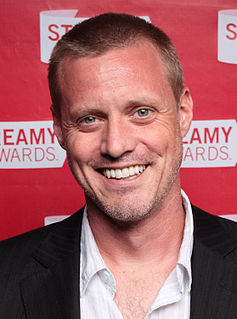A Quote by Walter Kiechel
The business schools could do a better job teaching face-to-face management, the actual work of organizing and helping along the efforts of others in the organization. The more quantitative disciplines have gotten more attention, often more research dollars. Areas like organizational science or, even mushier, leadership have had more trouble settling on what it's important to teach, and how. It's rather like strategy itself, which as I argue in the book, has had trouble through most of its history figuring out how to incorporate people, their motivation and ability, into its calculations.
Quote Topics
Ability
Actual
Along
Areas
Argue
Attention
Better
Better Job
Book
Business
Business School
Calculations
Could
Disciplines
Dollars
Efforts
Even
Face
Face-To-Face
Figuring
Gotten
Had
Helping
History
How
Important
Incorporate
Itself
Job
Leadership
Like
Management
More
Most
Motivation
Often
Organization
Organizational
Organizing
Others
Out
People
Quantitative
Rather
Research
Schools
Science
Settling
Strategy
Teach
Teaching
Through
Trouble
Which
Work
Related Quotes
We have to convince people that they have the power to elect people. The people they are electing are the ones making the decisions about how our tax dollars are going to be spent. Is it going to be for more jails, or for more schools? For more house services? It's very important that people understand that, do their research and find out who to vote for.
More often than not when we do not like our work, it's not necessarily because of the work itself. But more often because of the people we work with and more importantly because of the lack of leadership. It is amazing how inspired and motivated we can be when we like the people and when we feel like we show up to work because our leaders care about our wellbeing. It is kind of incredible actually.
Life is getting through the moment. The philosopher William James says to cultivate the cheerful attitude. Now nobody had more trouble than he did -- except me. I had more trouble in my life than anybody. But your first big trouble can be a bonanza if you live through it. Get through the first trouble, you'll probably make it through the next one.
I'm not good looking. I'm very strange - a very bony face on an enormous skull, and I don't like to be naked because I don't like how I look naked. And - no, no. I own a lot of my house, because I'm Irish and from people who never owned anything. So I could have a lot more trappings of wealth if every time I had 20 extra dollars I didn't pay off more of the mortgage.
I really like the "two is better than three" line. People ask me is this drama or comedy? I just think the more colors you have to a film the better. The more genres, the more people will like it. I like relating to the whole general speaking public. The script itself is 99 pages but the novel it is based on is 600. I had to leave a lot of stuff out of the script. I had a limitation of what I could present on the big screen.
Business people face increasing pressure from local and global competitors. They face customers who have more and more information about alternatives and more and more access to suppliers from all over the world. Given these pressures, business people are looking for approaches that make sense and will continue to make sense. I think many are fed up with management fads that may or may not provide any benefit and don't continue to work over time.
I used to read more when I was a kid than I do now. It was all sort of fuel for the fire to teach you how to think and how to make things and it informed the architecture that I was doing. It's better coming in with that history and that kind of knowledge and depth of understanding of humanity that is very important for building buildings - for understanding people and how they should live and how you could make your lives better and stuff like that.
When I was young, I had this feeling that there was this handbook that I had never gotten that explained how to be, how to laugh, what to wear, how to stand by yourself in the hallway. Everyone looked so natural - like they all practiced and knew exactly what to do - even the way they pushed their hair out of their face.
That's the most important thing, to get along with people. When you feel like you click with them. That's more important even then what their background is or what they've done before, how good they are, how new they are or whatever. All that stuff is really secondary to just getting along with the person.
The single most damaging misconception about strategy is that it is a set of financial performance goals. The so-called "strategies" created by many managements are nothing more than three-to-five year financial performance forecasts. They are then labeled "strategy" and shipped off to the board of directors which goes through the motions of discussing how big the numbers are. Strategy is not your aspirations. Strategy is concerned with how you will arrange your actions and resources to punch through the challenges you face.



































